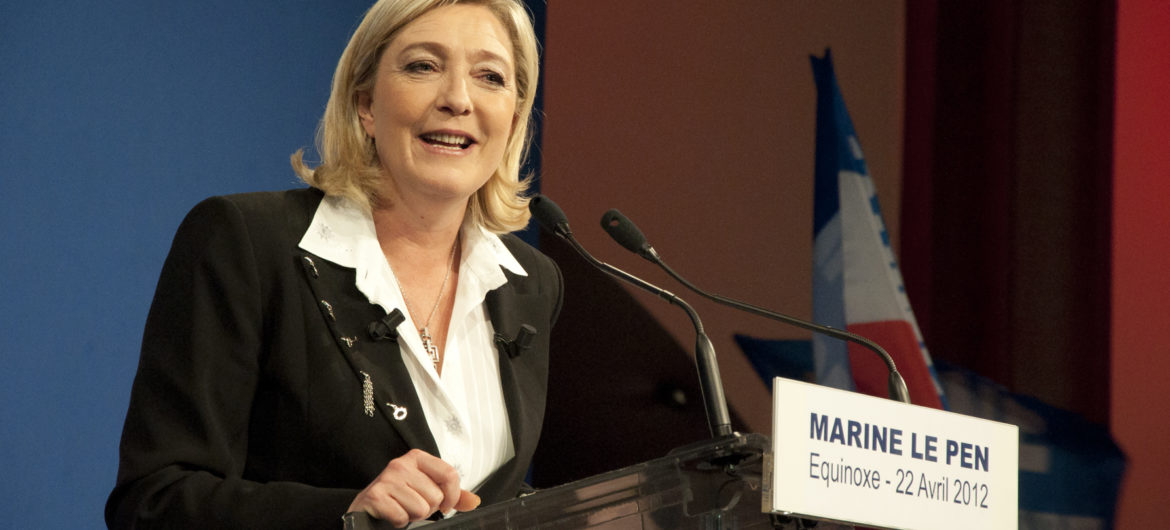Marine Le Pen has announced her candidacy for the 2022 French Presidential election.
Venice Hancock | News Sub-Editor
On January 16, politician Marine Le Pen, President of the Rassemblement National, France’s right wing populist and nationalist party, announced her candidacy for the next presidential election. In two years time.
In a statement to the press she expressed that the motivation behind this decision stems from her will to “unite” the French people and to “get the country back on its feet”. She did also recognise that it was still up to the party’s congress to deliberate and pick a candidate to represent them in this presidential race, however, the chances of them not rallying behind their President is extremely unlikely.
This is the third time in her political career that she will be participating in the race for the Presidency. Le Pen ran for the first time back in 2012, coming in third in the first round of voting, having won 17.90% of popular votes. She ran again in 2017, this time making it to the second round of voting, losing out to current French President Emmanuel Macron by 32.2% of votes.
It is the announcement of this candidacy two years and three months ahead of time that has come as a surprise to the French people. The Rassemblement National has rationalised this decision by accusing sitting President Macron of “constantly campaigning” anyways. Furthermore, it seems that Le Pen hopes to capitalise on the growing social unrest in France, taking advantage of recent major strike actions and the Gilets Jaunes movement who have expressed discontent with the current government. She thus hopes that by presenting herself as the candidate in diametric opposition to Macron’s presidency, she can rally more and more supporters. This year also kicks off a set of local elections throughout France, starting with the Municipales, in which Marine Le Pen hopes to make advancements for her party and win further support for the presidential election.
While Le Pen is known for her strict anti-EU and anti-immigration stances, amongst others, since 2018 she has been trying to rebrand her party previously known as the “National Front”. Her father, Jean-Marie Le Pen who co-founded the party in 1972 was known for his extreme racist and antisemitic views and Marine has attempted to distance herself from him in an effort to make the Rassemblement National more appealing to a wider demographic. This move is also a strategy to legitimise the party in the public eye and Le Pen hopes this will shift public perception of the Rassemblement National and its values as a potential governing force rather than a protest movement.
Marine Le Pen is known for advocating protectionist economic policies, being against globalisation and has an apathy for transnational organisations. She is in favour of France leaving the European Union, has pledged to remove France’s NATO membership and advocates for the abolition of the International Monetary Fund and the replacement of the World Trade organisation. She favours a privileged relationship with Russia.
She is also a vocal critic of multiculturalism in France, especially when it comes to Muslim women and their right to wear Islamic dress in public spaces. She believes in what she calls the “de-Islamisation” of French society. Le Pen is famous in France for her anti-immigration ideas. In the context of the current refugee crisis facing Europe, Le Pen’s answer is for France to withdraw from the Schengen area and for the country to reinstate hard borders.
On social issues, Le Pen supports the legality of abortion, however, she is opposed to euthanasia and has declared she would abolish same-sex marriage if she is elected to the office of President.
Safe to say, France would look radically different under a Le Pen presidency. While we are still far away from the 2022 election, Le Pen’s growing popularity amongst the French people makes her one of the major actors to keep an eye on in the run up to the election. With France’s two traditionally dominant political parties, the Party Socialiste and Les Républicains losing popular support at an increasing rate, this election could prove to be even tighter and radical than the last one.
[Image Credit: Rémi Noyon]





